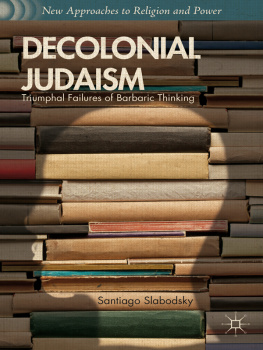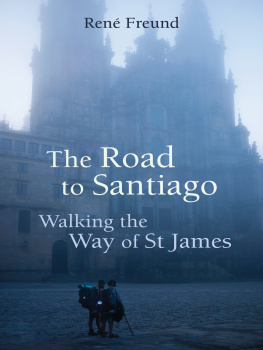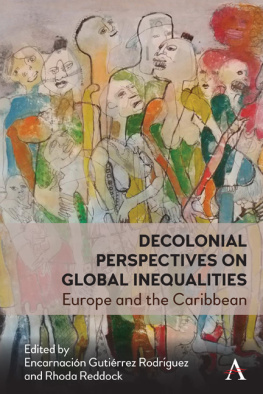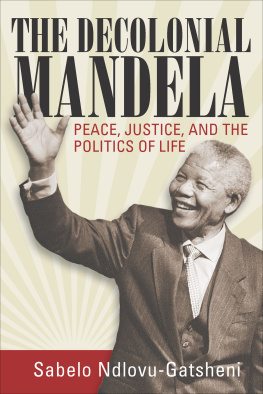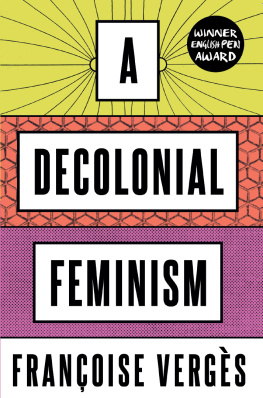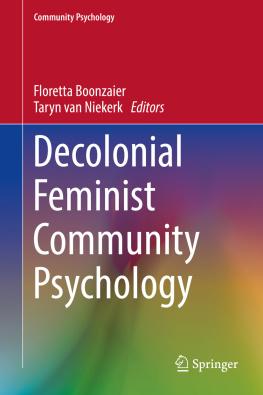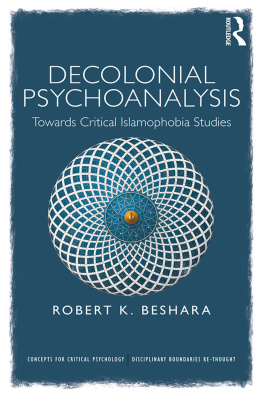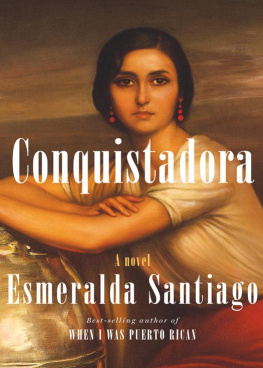Santiago Slabodsky - Decolonial Judaism
Here you can read online Santiago Slabodsky - Decolonial Judaism full text of the book (entire story) in english for free. Download pdf and epub, get meaning, cover and reviews about this ebook. year: 2014, publisher: Palgrave Macmillan, genre: Romance novel. Description of the work, (preface) as well as reviews are available. Best literature library LitArk.com created for fans of good reading and offers a wide selection of genres:
Romance novel
Science fiction
Adventure
Detective
Science
History
Home and family
Prose
Art
Politics
Computer
Non-fiction
Religion
Business
Children
Humor
Choose a favorite category and find really read worthwhile books. Enjoy immersion in the world of imagination, feel the emotions of the characters or learn something new for yourself, make an fascinating discovery.
- Book:Decolonial Judaism
- Author:
- Publisher:Palgrave Macmillan
- Genre:
- Year:2014
- Rating:4 / 5
- Favourites:Add to favourites
- Your mark:
- 80
- 1
- 2
- 3
- 4
- 5
Decolonial Judaism: summary, description and annotation
We offer to read an annotation, description, summary or preface (depends on what the author of the book "Decolonial Judaism" wrote himself). If you haven't found the necessary information about the book — write in the comments, we will try to find it.
Decolonial Judaism — read online for free the complete book (whole text) full work
Below is the text of the book, divided by pages. System saving the place of the last page read, allows you to conveniently read the book "Decolonial Judaism" online for free, without having to search again every time where you left off. Put a bookmark, and you can go to the page where you finished reading at any time.
Font size:
Interval:
Bookmark:
NEW APPROACHES TO RELIGION AND POWER
Series editor: Joerg Rieger
While the relationship of religion and power is a perennial topic, it only continues to grow in importance and scope in our increasingly globalized and diverse world. Religion, on a global scale, has openly joined power struggles, often in support of the powers that be. But at the same time, religion has made major contributions to resistance movements. In this context, current methods in the study of religion and theology have created a deeper awareness of the issue of power: critical theory, cultural studies, postcolonial theory, subaltern studies, feminist theory, critical race theory, and working class studies are contributing to a new quality of study in the field. This series is a place for both studies of particular problems in the relation of religion and power as well as for more general interpretations of this relation. It undergirds the growing recognition that religion can no longer be studied without the study of power.
Series editor:
Joerg Rieger is Wendland-Cook Professor of Constructive Theology in the Perkins School of Theology at Southern Methodist University.
Titles:
No Longer the Same: Religious Others and the Liberation of Christian Theology
David R. Brockman
The Subject, Capitalism, and Religion: Horizons of Hope in Complex Societies
Jung Mo Sung
Imaging Religion in Film: The Politics of Nostalgia
M. Gail Hamner
Spaces of Modern Theology: Geography and Power in Schleiermachers World
Steven R. Jungkeit
Transcending Greedy Money: Interreligious Solidarity for Just Relations
Ulrich Duchrow and Franz J. Hinkelammert
Foucault, Douglass, Fanon, and Scotus in Dialogue: On Social Construction and Freedom
Cynthia R. Nielsen
Lenin, Religion, and Theology
Roland Boer
In Search of Gods Power in Broken Bodies: A Theology of Maum
Hwa-Young Chong
The Reemergence of Liberation Theologies: Models for the Twenty-First Century
Edited by Thia Cooper
Theological Perspectives for Life, Liberty, and the Pursuit of Happiness: Public Intellectuals for the Twenty-First Century
Edited by Ada Maria Isasi-Diaz, Mary McClintock Fulkerson, and Rosemary Carbine
Religion, Theology, and Class
Edited by Joerg Rieger
Messianism Against Christology: Resistance Movements, Folk Arts, and Empire
James W. Perkinson
Decolonial Judaism: Triumphal Failures of Barbaric Thinking
Santiago Slabodsky
Decolonial Judaism
Triumphal Failures of Barbaric Thinking
Santiago Slabodsky


DECOLONIAL JUDAISM
Copyright Santiago Slabodsky, 2014.
All rights reserved.
First published in 2014 by
PALGRAVE MACMILLAN
in the United Statesa division of St. Martins Press LLC,
175 Fifth Avenue, New York, NY 10010.
Where this book is distributed in the UK, Europe and the rest of the world, this is by Palgrave Macmillan, a division of Macmillan Publishers Limited, registered in England, company number 785998, of Houndmills, Basingstoke, Hampshire RG21 6XS.
Palgrave Macmillan is the global academic imprint of the above companies and has companies and representatives throughout the world.
Palgrave and Macmillan are registered trademarks in the United States, the United Kingdom, Europe and other countries.
ISBN: 9781137365316
Library of Congress Cataloging-in-Publication Data
Slabodsky, Santiago, 1977 author.
DeColonial Judaism : triumphal failures of barbaric thinking.
pages cm
Includes bibliographical references and index.
ISBN 9781137365316 (alk. paper)
1. Decolonization. 2. Political sciencePhilosophy. 3. Civilization, WesternJewish influences. 4. Judaism and politics. 5. JewsPolitics and government20th century. 6. Other (Philosophy) I. Title.
JV151.S53 2014
325.3dc 32013050468
A catalogue record of the book is available from the British Library.
Design by Newgen Knowledge Works (P) Ltd., Chennai, India.
First edition: July 2014
10 9 8 7 6 5 4 3 2 1
To my abuelas/abuelos
Gita/Arnoldo
Clara/Santiago
East/South
Socialist/Radical
Cosmopolitan/Laborer
Jews
Latin Americans
Barbarians
Contents
Acknowledgments
It is customary to start this section in a straightforward manner acknowledging the writers networks of support. The responsibility is to extend gratitude and exculpate extraordinarily generous individuals and institutions of the mistakes contained in ones volume. I learned from the history of barbarism, however, that co-conspirators are usually blamed for culpas ajenas (foreign transgressions). While a civilized gesture would be to exculpate my interlocutors, my barbaric impulse impels me to do the contrary. Since this book responds to challenges my comrades presented to me over the years in four continents and no intellectual contribution is made in isolation from a community, I show my gratitude by making them co-guilty in this enterprise.
First of all I would like to thank/blame people who have been on call throughout this process. Over ten years ago Marc Ellis, pioneer of Jewish liberation theology, enlisted a peripheral Jew as a junior conversation partner and since that time has served, for me, as a model for twenty-first century Jewish committed intellectualism. Rachel Gostenhofer is the primary individual responsible for the sophistication of this text, editing (and re-editing) my Spanglish bringing it to a level that could not have been achieved without the skills and commitment of a superb scholar and longtime friend. My peers in Berlin, Chicago, Vitoria/DC, and Gronigen, Manuela Boatc, Robert Smith, Michael Marder, and Stefania Travagnin, walked with me through different steps of the process offering not only scholarly encouragement but also warm humor that made it possible to overcome the obstacles such an endeavor inevitably entails. My doctoral students, Ann Hidalgo, Drew Baker, Yi Shen Ma, and Chris Carter were and continue to be an incredible source of vitality. Ann wonderfully edited my first drafts and with Drew, Yi Shen, and Chris have been a continuous epistemological challenge, making my Claremont years a fruitful intercultural and inter-religious experience.
In the second place, I would like to thank/blame senior scholars who supported my work when I was conducting research and writing this book. They entered into conversations with me, published my work, invited me to lecture and teach in their institutions around the world, and/or offered me wonderful advice about the publication of this book. I owe a substantial debt of gratitude to Robert Gibbs, Walter Mignolo, Vincent Wimbush, Ramon Grosfoguel, Enrique Dussel, Eric Meyers, Nancy Bedford, Malachi Hacohen, Ivan Kalmar, Kurt Anders Richardson, Lewis Gordon, Salman Sayyid, Nelson Maldonado-Torres, Paul Myrhe, Jonathan Judaken, Fernando Segovia, Victoria Fontan, Luis Rivera-Pagan, Samuel Pagan, Mitri Raheb, Miguel de la Torre, and Elizabeth Conde Frazier. A special thanks to the editor of New Approaches to Religion and Power, Joerg Rieger and the blind reviewers, editors, and team members at Palgrave including Burke Gerstenschlager, Caroline Kracunas, Devon Wolkfiel, Rachel Taenzler, and Madeline Crum.
In Claremont wonderful colleagues made it possible for me to navigate the first years of my life as a young professor even when my incurable barbarism inevitably posed its challenges, as well as caused me to create imaginary ones. I would like to thank/blame all the faculty and staff and name close friends including Helene Slessarev-Jamir, Grace Kao, Frank Rogers, Marvin Sweeney, Roland Faber, Richard Amesbury, Najeeba Syeed-Miller, Monica Coleman, David Jamir, Sheryl Kujawa-Holbrook, Lynn OLeary-Archer, Dennis McDonalds, Kathy Black, Gamward Quan, Duane Bidwell, Jeffrey Kuan, Martha Barcenas, Donna Porras, and the soul of the institution Sansu Woodmancy. Forming part of my extended institutional network and a continued source of inspiration, I would also like to thank my Latina/o Wabash cohorts including Angela Tarango, Jacqueline Hidalgo, Chris Tirres, Cludio Carvalhae, and Gregory Cuellar as well as my social organizers/public intellectual comrades Paulina Gonzalez, Mario Brito, Carolina Fuchs, and Clara Takarabe.
Next pageFont size:
Interval:
Bookmark:
Similar books «Decolonial Judaism»
Look at similar books to Decolonial Judaism. We have selected literature similar in name and meaning in the hope of providing readers with more options to find new, interesting, not yet read works.
Discussion, reviews of the book Decolonial Judaism and just readers' own opinions. Leave your comments, write what you think about the work, its meaning or the main characters. Specify what exactly you liked and what you didn't like, and why you think so.

